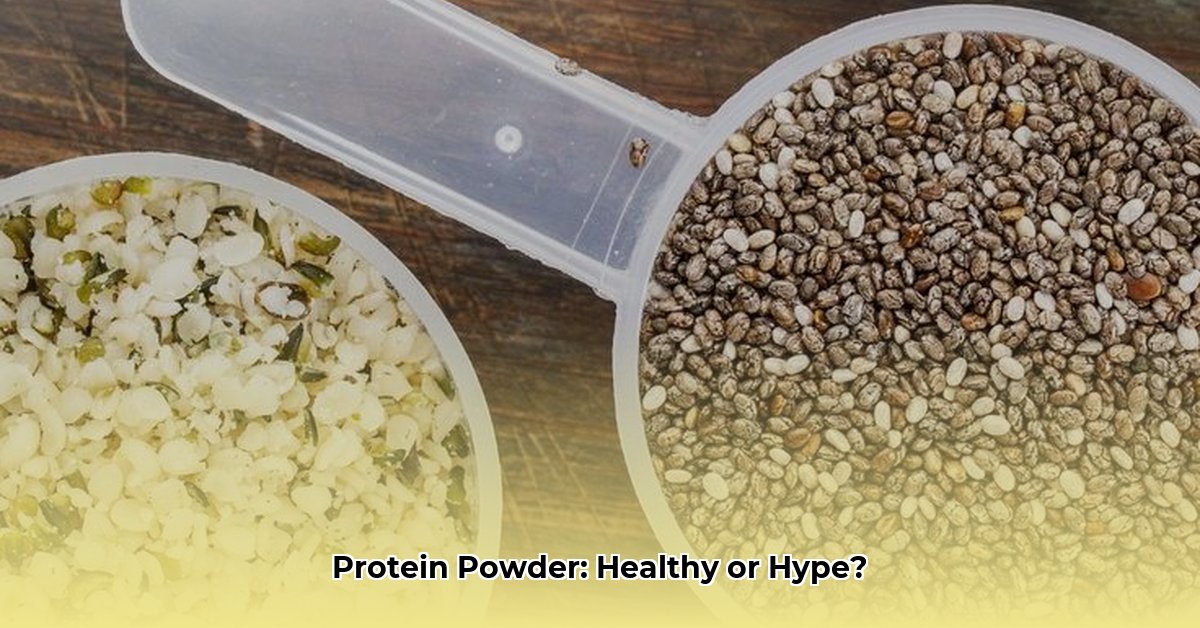Protein powder is a popular supplement, but separating fact from fiction can be challenging. This guide provides evidence-based information to help you understand the benefits, risks, and best practices for choosing a high-quality protein powder.
Understanding Protein Powder
What is Protein Powder?
Protein powder is a concentrated form of protein derived from various sources, including milk (whey and casein), plants (soy, pea, rice, and hemp), and eggs. It’s essentially a convenient way to increase your protein intake. Manufacturers often add ingredients like sugars, flavors, thickeners, vitamins, and minerals.
Why Use Protein Powder?
- Weight Management: Protein promotes satiety, which can help control cravings and support weight loss by reducing overall calorie intake.
- Muscle Growth and Recovery: Protein provides amino acids, the building blocks for muscle repair and growth, particularly important after exercise.
- Convenience: A quick and easy way to boost protein intake, especially for busy lifestyles.
- Dietary Needs: Helpful for individuals who struggle to meet their protein requirements through diet alone, such as vegans, vegetarians, older adults, or those recovering from illness or injury.
Potential Risks of Protein Powder
While generally safe, protein powder can have potential downsides:
Digestive Issues
Some individuals may experience bloating, gas, or stomach cramps, especially with certain protein sources or if they are lactose intolerant.
Kidney Strain
Excessive protein intake, particularly in those with pre-existing kidney issues, may stress the kidneys. It’s crucial to follow recommended dosages and consult a doctor if you have any kidney concerns.
Skin Problems
Some research suggests a potential link between high protein intake and acne, especially in individuals with sedentary lifestyles. However, more research is needed to solidify this connection.
Nutrient Deficiencies
Relying solely on protein powder can lead to nutrient deficiencies if whole foods are neglected. A balanced diet rich in fruits, vegetables, and whole grains is essential.
Contaminants
Some protein powders may contain heavy metals, BPA, or other toxins due to less stringent regulations in the supplement industry compared to the food industry. Choosing certified products from reputable brands is critical.
Added Sugars and Interactions
Many protein powders contain added sugars, which can contribute to weight gain and other health issues. Always check the nutrition label and choose products with minimal added sugar. Additionally, protein powder may interact with certain medications. Consult your doctor if you are taking any prescriptions.
Choosing the Right Protein Powder: A Step-by-Step Guide
1. Read the Label Carefully
Scrutinize the nutrition label for protein content per serving, added sugars, artificial ingredients, and fillers. Aim for a short, clean ingredient list.
2. Look for Third-Party Certifications
Choose products tested by reputable organizations like NSF Certified for Sport or Informed-Choice. These certifications help ensure product quality and safety.
3. Consider Your Goals and Dietary Needs
- Muscle Growth: Whey protein is a good option due to its rapid absorption.
- Weight Management: Protein powders with added fiber can increase satiety.
- Vegan/Vegetarian: Opt for plant-based proteins like soy, pea, brown rice, or hemp.
- Lactose Intolerance: Avoid whey and casein; choose plant-based options or hydrolyzed whey.
4. Prioritize Quality and Reputable Brands
Select brands known for transparency, quality sourcing, and rigorous testing.
5. Consider Taste and Mixability
Read reviews and consider trying smaller sizes before committing to a large container to ensure you enjoy the taste and texture.
Protein Powder Types: A Comparison
| Type | Source | Digestion Rate | Pros | Cons |
|---|---|---|---|---|
| Whey | Milk | Fast | Promotes muscle growth, readily available, mixes easily | May cause digestive issues in lactose-intolerant individuals |
| Casein | Milk | Slow | Supports muscle recovery, reduces muscle breakdown overnight | Can be thicker and less palatable than whey |
| Soy | Soybeans | Moderate | Complete protein source, plant-based, affordable | Potential allergen for some individuals |
| Pea | Peas | Moderate | Hypoallergenic, plant-based, suitable for sensitive stomachs | May be less effective than whey for muscle building |
| Brown Rice | Rice | Moderate | Hypoallergenic, plant-based, easily digestible | Often less palatable, lower in some essential amino acids |
| Hemp | Hemp Seeds | Moderate | Plant-based, good source of omega-3 fatty acids | Can be gritty and have a strong earthy flavor |
Dosage and Safety
Consult a healthcare professional or registered dietitian for personalized dosage recommendations. General guidelines suggest 0.8 grams of protein per kilogram of body weight for the average adult, but individual needs vary based on activity level, age, and health goals.
The Bottom Line
Protein powder can be a useful tool for supplementing your diet, but it shouldn’t replace whole foods. Prioritize a balanced diet, regular exercise, and adequate sleep for optimal health. Choose protein powder wisely, considering your individual needs, and consult a healthcare professional if you have any concerns. Remember that research is ongoing, so staying informed about the latest findings is crucial.
- Borosilicate Glass Food Storage Containers Bring Durable Safety To Your Kitchen - January 22, 2026
- Microwave Safe Glass Containers for Durable Everyday Food Prep - January 21, 2026
- Borosilicate Glass Containers Offer Superior Food Storage and Meal Prep - January 20, 2026










